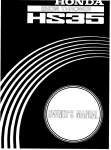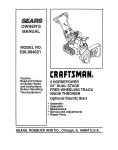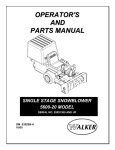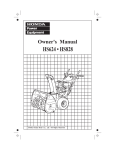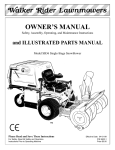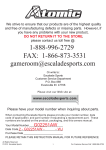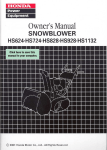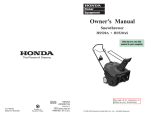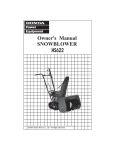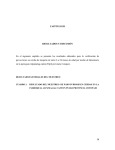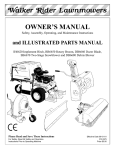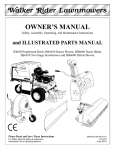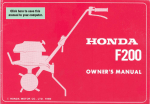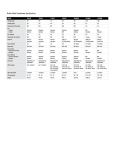Download Honda HS50 User's Manual
Transcript
Owner's Manual SNOW BLOWER HS50 ©1983 Honda Motor Co., Ltd. — All Rights Reserved Thank you for purchasing a Honda snowblower. This manual covers operation and maintenance of the HS.50 snowblower. All information in this publication is based on the latest product information available at the time of approval for printing. Honda Motor Co., Ltd. reserves the right to make changes at any time without notice and without incurring any obligation. No part of this publication may be reproduced without written permission. This manual should be considered with the snowblower when sold. Pay special attention to statements a permanent part of the snowblower and remain preceded by the following words: .m Indicates a strong possibility of severe personal injury or loss of life if instructions are not followed. CAUTION: Indicates a possibility of personal injury or equipment damage if instructions are not followed. NOTE: Gives helpful information. If a problem should arise, or if you have any questions about the snowblower consult an authorized Honda dealer. m The Honda snowblower is designed to give safe and dependable service if operated according to instructions. Read and understand the Owner’s Manual before operating the snowblower. Failure to do so could result in personal injury or equipment damage. 1 / CONTENTS 1. SAFETY ....................................... 2. COMPONENT IDENTIFICATION AND FUNCTION ..... ............................... Engineswitchknob Fuel valve knob ................................... ..................................... Chokeknob Starter grip ...................................... Throttle lever .................................... Shift lever ....................................... Auger clutch lever and drive clutch lever ............... Chute crank ..................................... Chute guide ..................................... Skidplate ....................................... Height adjustment pedal ............................ 3. PRE-OPERATION CHECK ......................... Fuellevel ....................................... Engine oil level ................................... 4. STARTING THE ENGINE .......................... 5. SNOWBLOWER OPERATION ....................... 6. STOPPING THE ENGINE ........................... 7. MAINTENANCE ................................. ., ...... Maintenance schedule ....................... Toolkit ........................................ ................................. Engineoilchange Spark plug service ................................. Track adjustment (Track model only) ................. 8. STORAGE ....................................... 9. TROUBLESHOOTING ............................. 10. SPECIFICATIONS ................................ 11. WARRANTY SERVICE ............................ 3 6 8 8 9 9 10 10 11 12 12 13 14 15 15 16 17 20 22 23 24 25 26 27 28 29 33 ‘34 35 1. SAPETY To ensure safe operation * Read this owner’s manual thoroughly and understand the operating procedure before using the snowblower. Never permit anyone to operate the snowblower without proper instructions. * Do not allow children to operate the snowblower. Keep children and pets away from the area of operation. * Be properly dressed in winter clothing. Wear slip-proof winter boots. * Before operating the snowblower, inspect the area you are going to clear of snow. Remove doormats, sleds, sticks, boards, wires and other obstacles before using the snowblower. * Never clear snow from gravel road or drive as rocks are picked up and thrown. * Don’t use the snowblower where visibility is bad, or at nighttime under poor lighting conditions. * Inspect the snowblower before operating it. If it is malfunctioning, repair it before operating it. * Be careful in turning the direction of the snowblower, while operating it on a slope. Do not use the snowblower to remove snow from roofs and from steep slopes. * The snowblower may not stand by itself on slopes; do not leave it unattended. 3 * Adjust the snow chute to avoid hitting bystanders, windows, etc. with thrown snow. Stay clear of the discharge opening. * While operating the snowblower, always hold the handle firmly and walk. Don’t run. * If people or pets suddenly appear in front of the snowblower, while it is in operation, immediately release the auger and drive clutch levers., * When you hit an obstacle while operating the snowblower, stop the engine immediately and check the machinery for damage. Don’t operate a damaged machine because you may cause an accident. * Before unclogging the discharge guide, turn the engine OFF. * Exhaust gas contains poisonous carbon monoxide. Never run the snowblower in an enclosed area. Be sure to provide adequate ventilation. * Gasoline is extremely flammable and explosive under certain conditions. Refuel in a well ventilated area with the engine stopped. * When transporting the snowblower, turn the Fuel valve OFF and keep the snowblower level to prevent fuel spillage. 2. ~~MP~~NT~DENTIFI~ATI~NANDFUNCTI~N <WHEEL TYPES DRIVE CLUTCH LEVER SPARK PLUG CHUTE GUIDE FUEL cApl( GRIP CHUTE AUGER AUGER CLUTCH LEVER STARTER CHUTE CHOKE GRIP CRANK KNO FUEL VALVE KNOB ENGINE SWITCH ENGINE OIL DRAIN PLUG Q TRACK TYPE > SHIFT LEVER DRIVE CLUTCH SPARK PLUG CHUTE GRIP GUIDE AUGER CLUTCH I CHUTE LEVER CRANK STARTER GRIP INE OIL mER CAP CHOKE KNO ENGINE SWITCH HEIGHT ADJUST MENT PEDAL -SKID PLATE ENGINE OIL DRAIN PLUG ENGINE SWITCH KNOB Use the engine switch to START and STOP the engine. ENGINE \ I-lriif SWITCH KNOB FUEL VALVE KNOB This knob opens and closes the fuel line leading from the fuel tank to the carburetor. Make sure that the knob is positioned exactly on either the ON or OFF position. LLL’ i ~/JE~VALVE KNo8’l I I I NOTE: Before transporting snowblower be sure to turn the knob to OFF to prevent possible fuel leaks. 8 CHOKEKNOB Use the choke knob when the engine is cold or difficult to start. OPEN CiiOKE I ’ KNOti” STARTERGRIP Pull this grip to start the engine. STARTER GRIP THROTTLE LEVER (ENGINE SPEED) Use the throttle position. lever to select the engine speed. In normal operation, ROTTLE SHIFT LEVER Use the shift lever to select drive speed or direction. 1: LOW SPEED 2: MEDIUM SPEED 3: HIGH SPEED R: REVERSE SHIFT 10 LEVER use the “HIGH” LEVER AUGER CLUTCH LEVER AND DRIVE CLUTCH LEVER Use these controls to engage the snow blowing mechanism and/or the drive mechanism. DRIVE AUGER CLUTCH LEVER Squeeze to engage the snow blowing mechanism. CLUTCH ueese to engage the ve mechanism. NOTE: When both levers are squeezed, the drive clutch lever locks the auger clutch lever down. Releasing the drive clutch lever then unlocks and releases the auger clutch lever. Both levers squeezed. The auger clutch lever remains locked down SO long as one hand continues to squeeze the drive clutch lever. 11 CHUTECRANK Use the chute crank to turn the snow discharge chute right or left. To throw snow to the left CHUTE CRANK CHUTEGUIDE The chute guide controls the snow discharge angle. High and far CHUTE 12 GUIDE HANDLE SKID PLATE Adjust the skid plates for the auger housing ground clearance best suited to your snow removal conditions. AUGER HOUSING SNOW REMOVAL CONDITIONS For general use For use on uneven surfaces For use on flat surfaces GUARD RECOMMENDED AUGER HOUSING GROUND CLEARANCE 6- lo-30 0- 8 mm (0.24-0.31 in) mm (0.39-1.18 in) 5 mm (O-0.20 in) NOTE: Track model only - The position of the height adjustment pedal (p. 14) also affects auger housing ground clearance. Set the height adjustment pedal in the middle position (II) before adjusting the skid plates. HEIGHT ADJUSTMENT PEDAL (Track model only) Use the pedal for adjusting the height and angle of the machine in relation tracks. 1. Hold the handles and step on the pedal. 2. Raise or lower the machine to the desired position and release the pedal. LOW MIDDLE : : Normal use HIGH : Deep snow or for transporting the HS50 HEIGHT PEDAL Hard snow or fine finish ADJUSTMENT LOW MIDDLE .- 14 HIGH to the 3. PRE-OPERATION CHECK FUEL LEVEL Inspection: Unscrew the fuel cap. Check the fuel level. Refueling: Use any regular grade automotive gasoline (unleaded gasoline is preferred) with a pump octane rating of 86 or’higher. Never use an oil/gasoline mixture. Prevent dirt, dust or water from entering the fuel tank. CAUTION: Gasoline substitutes are not recommended: they may be harmfull to the fuel system components. FUEL TANK CAPACITY: 3.5 Q (0.92 US gal, 0.77 Imp. gal.) * Gasoline is extremely flammable and explosive under certain conditions. Refuel in a well ventilated area with the engine stopped. * Do not smoke or allow flames or sparks in the area where the snow thrower is being refueled or where gasoline is stored. Be careful not to spill fuel when refueling. Fuel vapor or spilled fuel may ignite. 4 Make sure the area is dry of spilled fuel before starting the engine. * * DQ not overfill the tank (there should be no fuel in the filler neck). After refueling, make sure the fuel cap is closed securely. * Do not refuel in snow because snow will get into fuel tank and cause engine malfunction. 15 ENGINE OIL LEVEL Inspection: With the snowblower on a level surface, remove the oil filler cap and check the oil level. If the level is low, fill to the top of the oil filler neck with the recommended oil. Oil filler neck OIL CAPACITY: RECOMMENDED -20 1 '-30 0 -20 20 -10 40 o W’F 1 1ooc 0.7, P (0.74 US qt, 0.62 Imp. qt) I OIL: Use high detergent, premium quality motor oil certified to meet or exceed U.S. automobile manufacturers’ requirements for service classification SE or SF (Motor oils classified SE or SF will show this designation on the container.) Select the appropriate oil viscosity for the average temperature in your’ area, as shown in this chart. SAE 5W-30 is recommended for general, all-temperature use. CAUTION. * Engine oil is a major factor affecting engine’ performance and service life. Nondetergent or vegetable oils are not recommended. * Running the engine with insufficient oil can cause serious engine damage. 16 4. STARTING THE ENGINE 1. Turn the engine switch to the ON position. Engine switch 2. Turn the fuel valve to the ON position. Fuel valve 17 3. In cold weather and when the engine is cold, turn the choke knob to the CLOSE position. CHOKE’KNOB 4. Pull the starter grip lightly until you feel resistance, then pull briskly. ARTER GRIP NOTE: Don’t allow the rope to snap back; return it gently by hand. Otherwise, the starting mechanism might be damaged. While the engine is in operation, don’t pull the starter grip or damage may result. 18 c 5. Let the engine warm up for several minutes. If the choke has been turned to the CLOSE position, return it gradually to the OPEN position as the engine warms up. I? 5. ) SNOWBLOWER OPERATION 1. Raise the throttle lever (p. 10) to the high position for normal operation. 2. Move the shift lever (p. 10) to select the desired drive speed. DRIVE SPEED WITH LEVER IN THE HIGH POSITION 1 ~~~~ Wheel type _ r 1 ’ 1 0.32 m/s (1.05 ft/s) 2 0.50 m/s (1.64 ft/s) 3 0.74 m/s (2.43 ft/s) I ! 1 R 1 0.49 m/s (1.6 1 ft/s) 1 I Track tvne - . 11 0.21 m/s (0.69 ft/s) 0.33 m/s (1.08 ft/s) 0.48 m/s (1.57 ftls), . 1 0.33 m/s (1.08 h/s) 1 CAUTION: Be sure to set the shift lever into the groove. Do not change direction while the machine is in motion. NOTE: Low speed (1) is recommended for removing deep or hard-packed snow. 3. Track model only - Use the height adjustment pedal (p. 14) to adjust the height and angle of the machine. 4. Adjust the chute direction (p. 12) and chute guide angle (p. 12). 5. Squeeze the auger clutch lever and drive clutch lever (p. 11) to propel the machine and commence snow clearing. High Altitude Operation When operating this snow-blower at high altitude the an-fuel mixture becomes overly rich and engine performance may be reduced and fuel consumption increased. See your authorized HONDA dealer for high altitude adjustment. .20 NOTE: To move the machine without engaging the snow blowing mechanism, squeeze the drive clutch lever only. Do this when moving the machine to or from the area to be cleared. l To engage the snowblowing mechanism without using the drive mechanism, squeeze the auger clutch lever only. Do this if you wish to maneuver the machine manually while clearing snow. l Squeeze both levers to propel the machine and clear snow simultaneously. When both levers are squeezed, the drive clutch lever locks the auger clutch leverdown (p.14). The auger clutch lever remains locked down so long as one hand continues to squeeze the drive clutch lever. Releasing the drive clutch lever then unlocks and releases the auger clutch lever. l If the snow is deeper than the height of the auger, move the machine back and forth to remove snow gradually. l For best efficiency, clear snow before it melts, refreezes and hardens. l AUGER CLUTCH’ LEVER Squeeze to engage the snow blowing mechanism. ueese to engage the drive mechanism. 21 6. STOPPING THE ENGINE 1. Turn the engine switch to the OFF position. ENGINE 2. Turn the fuel valve to the OFF position. FUEL. VALVE 22 SWITCH l------- 7. MAINTENANCE --- The purpose of inspection and maintenance is to keep the snowblower operating condition. Inspect or service as scheduled in the table on the next page. ~j ”I in the best Shut off the engine before performing inspection and maintenance, and remove the spark plug wire from the plug so the engine cannot be started. If the engine must be run, make sure the area is well ventilated. The exhaust contains poisonous carbon monoxide gas. CAUTION : l Place the snowblower on a level surface before performing inspection and maintenance. l Use only genuine HONDA parts or their equivalent. The use of replacement parts which are not of equivalent quality may damage the snowblower. 23 MAINTENANCESCHEDULE ’ Auger clutch cable Drive clutch cable Adjust Track Adjust Auger and blower *c3 Adjust Check *@I 0 0 0 Apply oil V-Belt Check *o Friction disc rubber Check w Friction disc shaft Apply oil Nuts, bolts, fasteners Check Fuel tube Replace *0 0 Everv 3 year * These items should be serviced by an authorized Honda dealer, unless the owner has the proper tools and is mechanically proficient. See the Honda Shop Manual for service information. @ These parts may require more frequent inspection use. 24 and replacement under heavy TOOL KIT ul ( 0 Spark plug wrench 1 Wrench handle 14x10 mm wrench 14x12 mm wrench Tool bag 25 ENGINE OIL CHANGE Drain the oil while the engine is still warm to assure rapid and complete draining. 1. Remove the drain plug and filler cap, and drain the oil. Retighten the plug securely. 2. Fill the crankcase with the recommended oil (see page 18) and check the level. OIL CAPACITY: 0.7 i? (0.74 US qt, 0.62 Imp qt) DRAIN f -----= -@I AT BOLT b UPPER LIMIT LOWER LIMIT OIL FILLER CAP HANDLE SPARK PLUG SERVICE Recommended spark plug: BR-4HS (NGK) W 14FR-U (ND) To ensure proper engine operation, the spark plug must be properly gapped and free of deposits. 1. Remove the spark plug cap. 2. Use the wrench supplied in the tool kit to remove the spark plug. 3. Visually inspect the spark plug. Discard it if the insulator is cracked or chipped. 4. Measure the plug gap with a feeler gauge. The gap should be 0.6-0.7 mm (0.024-0.028 in). Correct as necessary by bending the side electrode. 5. Attach the plug washer. Thread the plug in by hand to prevent cross-threading. 6. Tighten a new spark plug l/2 turn with the wrench to compress the washer. If you are reusing a plug, it should only take l/8-1/4 turn after the plug seats. CAUTION : The spark plug must be securely tightened. An iinproperly tightened plug can become very hot and possibly damage the generator. l Never use a spark plug with an improper heat range. l 0.6 0.7 mm SPARK PLUG WRENCH 27 TRACK - ADJUSTMENT (Track model only) ADJUSTMENT INTERVAL: Every year, before operation. CHECKING PROCEDURE: Tilt the snow thrower right or left and keep the track free. Check that the track isn’t deflect naturally and adjust it if necessary. 8 mm BOLT CRAWLER ADJUSTMENT 1. Loosen the 8 mm bolt on the rear track wheel on each side of the snow thrower. 2. Loosen left and right tension bolt lock nuts, and adjust the tension bolts to obtain the correct track deflection. 3. After adjustment, retighten the tension bolt lock nuts. TENSION 28 BOLT I I 8. STORAGE / i- i Before storing the snowblower for an extended period: 1. Be sure the storage area is free of excessive humidity 2. Drain the fuel - and dust. m Gasoline is extremely flammable and explosive under certain conditions. Do not smoke or allow flames or sparks in the area. FUEL ‘VALVE a. Drain the fuel. CARBURETOR DRAIN SCREW b. Loosen the carburetor drain screw, and drain the gasoline into a suitable container. Retighten the drain screw after all gasoline has been drained. Remove the spark plug and pour three tablespoonsful of clean motor oil into the cylinder. Pull the starter rope slowly two or three times to distribute the oil. Reinstall the spark plug. Pull the starter grip until resistance is felt. This closes the valves and breaker points, and protects them from dust and corrosion. Apply oil to the following parts for lubrication CHUTE ADJUSTING BOLT and rust prevention. I -m AUGER CLUTCH LEVER PIVOT 31 -l FRICTION DISK SHAFT 1. With the fuel tank drained, turn the chute forward and stand the snow thrower on end as shown. BOTTOM 2. Remove the bottom 3. Oil the friction disk shaft. Never oil the friction disk and dl disk. 4. Install the bottom COVER cover. cover. FRICTION DISK SHAFT -.. 9. TROUBLESHOOTING -- -1 1When the engine will not start :] 1. Is there enough fuel? 2. Is the fuel valve on? 3. Is gasoline reaching the carburetor? To check, loosen the drain screw with the fuel valve on. If any fuel is spilled, make sure the area is dry before testing the spark bw plug or starting the engine. Fuel vapor or spilled fuel may ignite. 4. Is the engine switch on? 5. Is there a spark at the spark plug? a. Remove the spark plug cap. Clean any dirt from around the spark plug base, then remove the spark plug. b. Install the spark plug in the plug cap. c. Turn the engine switch on. d. Grounding the side electrode to any engine ground, crank the engine to see if sparks jump across the gap. e. If there are no sparks, replace the plug. If OK, try to start the engine according to the instructions. 6. If the engine still does not start, take the snowblower to the dealer. IWhen the ~auger or blower will not operate: Check the shear bolts and replace if broken off. Secure the shear bolts with 6 mm nuts. Three spare shear bolts are supplied with the HS50 snowblower. SHEAR BOLTS 33 r 10. SPECIFICATIONS --Engine Model: Maximum output: Displacement: Bore x stroke: Starting method: Ignition system: Oil capacity: Fuel tank capacity: ~ Spark plug: Frame 34 HONDA engine G200 5.0 HP/l,800 r.p.m. (Cam shaft P.T.O.) 197 cm3 (12.1 cu.in) 67 x 56 cm (2.64 x 22.0 in) Manual (Recoil starter) Flywheel magneto type 0.7 liter (0.74 US qt, 0.62 Imp qt) 3.5 liter (0.92 US gal, 0.77 Imp gal) BR4HS (NGK), Wl4FR-U (ND) 11. WARRANTY SERVICE Owner Satisfaction Your satisfaction and goodwill are important to your dealer and to us. Normally, any problems with the product will be handled by your dealer’s service department. Sometimes, however, despite the best intentions of all concerned, misunderstandings can occur. If your problem has not been handled to your satisfaction, we suggest you take the following action: l Discuss your problem with a member of dealership management. Often complaints can be quickly resolved at that level. If the problem has already been reviewed with the Service Manager, contact the owner of the dealership or the General Manager. l If your problem still has not been resolved to your satisfaction, contact the Motorcycle and Power Products Customer Relations Department at the regional office of American Honda Motor Co., Inc. in your area. Regional office locations are shown on the following page. We will need the following information in order to assist you: -Your -Product -Date name, address, model and telephone and serial number number of purchase -Dealer name and address -Nature of the problem After reviewing all the facts involved, you will be advised of what action can be taken. Please bear in mind that your problem will likely be resolved at the dealership, using the dealer’s facilities, equipment, and personnel, so it is very important that your initial contact be with the dealer. Your purchase of a Honda product is greatly appreciated by both the dealer and American Honda Motor Co., Inc. We want to assist you in every way possible to assure your complete satisfaction with your purchase. 35 I -------- Regional Office Locations NORTHWEST REGIONAL OFFICE (includes Alaska) American Honda Motor Co.. Inc. MOtOrCvCle and P ower Products Customer Rela ,,ons Department PO_ -Box3028 ---5 Portland. Oregon 97220 Telephone: (5031255-1186 MIDWEST REGIONAL OFFICE American Honda Motor Co.. Inc. Motorcycle and Power Products Customer Relations Department P.O. Box’22 Greendale. Wisconsin 53129 Telephone: (4141421.9300 \ \ WESTERN REGIONAL OFFICE (includes Hawaii) American Honda Motor Co.. Inc. Motorcycle and Power Products Customer Relations Department P.O. Box 420 Gardena. California SO247 Teleohone: 12131 604-2524 _ SOUTHWEST REGIONAL OFFICE American Honda Motor Co.. Inc Motorcycle and Power Products Curtomar Relations Department P.O. Bon 5406 Irving. Texas 75062 Telephone: 12141 258.688 I3 36 NORTHEAST REGIONAL OFFICE American Honda Moior CO.. I~c. Motorcycle and Power Products Customer Relations Department P.0 Box749 U---*-w”, New Jersey 08067 I..““.vm.” Telephone ,: 16091 770.1100 SOUTHEAST REGIONAL OFFICE Iincludes Puerto Rico1 ‘:------Honda Mot& Co., Inc. ;y;;c,;; le end Power Products Customer Relations Depar(ment 6684 Jim mv Carter Boulevard N”.C,“S* - ---, Gkrgia 30071 Telephone: 1404) 448-1992 HONDA MOTOR CO., LTD. TOKYO, JAPAN POM53334 PN 31732010 10.0012 Printed on Recycled Paper PRINTED IN U.S.A.







































